شاہدصدیقی نے اس فرض کو ادا کیا ہے جو ہم سب پر قرض تھا:پروفیسر اخترالواسع
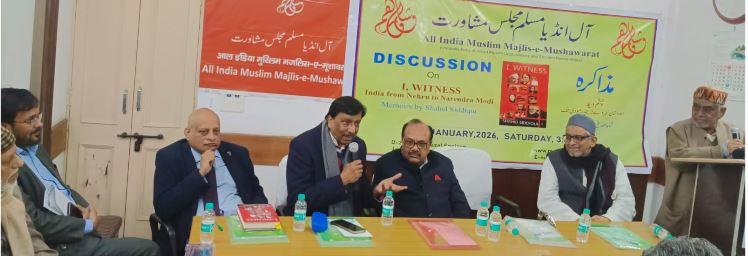
مسلم مجلس مشاورت میں صحافی و سیاستداں شاہدصدیقی کی کتاب’آئی وٹنس‘ پر مذاکرہ، حالات کی سنگینی پربحث،پڑوسی ممالک میں بڑھتی فرقہ پرستی پربھی تشویش کا اظہار، اقلیتوں کی بین الاقوامی کانفرنس بلانے کی تجویزبھی زیربحث آئی نئی دہلی25جنوری (پریس ریلیز): شاہدصدیقی نے آئی وٹنس(میری آنکھوں دیکھی) لکھ کر اس فرض کو ادا کیا ہے جو ہم سب پر قرض تھا۔ اس خیال کا اظہار ہفتے کو یہاں آل انڈیا مسلم مجلس مشاورت میں شاہد صدیقی کی کتاب پر مذاکرہ کے دوران مشہور اسلامی اسکالر پروفیسر اخترالواسع نے کیا۔ انہوں نے کہا کہ لوگ حالات کی سنگینی کا رونا روتے ہیں لیکن ہم حالات سے مایوس نہیں ہیں۔جو امت کربلا کے بعد ختم نہیں ہوئی، سقوط بغداد کے بعد ختم نہ ہوئی، 1857کے بعد بھی باقی رہی اور1992کے بعد بھی باقی ہے، وہ آئندہ بھی زندہ رہے گی جبکہ زیربحث کتاب ”آئی وٹنس: انڈیا فرام نہروٹو نریندر مودی“کے مصنف سینئر صحافی و سیاستداں شاہد صدیقی نے کہا کہ اس وقت پورے ساؤتھ ایشیابلکہ دنیا کے دوسرے حصوں میں بھی اقلیتیں خطرات میں گھری ہوئی ہیں،ان کو ظلم و زیادتی اور نفرت و عداوت کا سامنا ہے لیکن مایوس ہونے کے بجائے اسی عزم و ہمت اور حکمت ودانائی سے حالات کا سامنا کرنا ہوگاجس سے تحریک آزادی کے دوران اور اس کے بعد ہمارے بزرگوں نے کام لیا۔ انہوں نے زور دیا کہ ہمیں اپنے حقوق کے تحفظ کے ساتھ ساتھ بنگلہ دیش، پاکستان اور خطہ کے دوسرے ملکوں کی اقلیتوں کے ساتھ بھی کھڑا ہونا چاہیے۔ انہوں نے آل انڈیا مسلم مجلس مشاورت کو اقلیتوں کے حقوق اور ان کے ساتھ انصاف کے لیے ایک بین الاقوامی کانفرنس بلانے کا مشورہ بھی دیا۔انہوں نے کہا کہ تاریخ گواہ ہے کہ اقلیتوں کی لڑائی سیاسی جماعتیں نہیں، سماجی تنظیمات لڑتی ہیں۔کتاب کے مواد کے تعلق سے انہوں نے کہا کہ میری خوش قسمتی ہے کہ ان کرداروں کو زیادہ قریب سے دیکھنے اور سمجھنے کے مواقع ملے اور ایسے بہت سے واقعات کا گواہ ہوں جنھوں نے ملک کی سیاست اور سماج کو بڑے پیمانے پر متاثر کیا ہے۔ آل انڈیا مسلم مجلس مشاورت کے صدر فیروز احمدایڈوکیٹ نے اپنے صدارتی کلمات میں یقین دہائی کرائی کہ شاہد صدیقی صاحب کا مشورہ قابل عمل ہے اور مشاورت اس پر پوری سنجیدگی سے کام کریگی۔انہوں نے زور دیا کہ سیکولرزم ہی اس ملک کا مستقبل ہے جبکہ مشاورت کے سابق صدر نوید حامدنے حالات کی سنگینی کو تاریخ کی روشنی میں دیکھنے پر زور دیتے ہوئے زیربحث کتاب کو ایک گرانقدر دستاویز بتایا۔ اس سے قبل کتاب کے مندرجات کے حوالے سے جامعہ ملیہ اسلامیہ میں مرکز برائے سماجی وسیاسی شمولیت کے استاد ڈاکٹر مجیب الرحمٰن نے نئی نسل کو متوجہ کیا کہ یہ ایک قابل مطالعہ کتاب ہے جس سے ہندوستان کی سیاست، سماج اور اس کی باریکیوں کو سمجھنے میں مدد ملے گی۔ انہوں نے بعض نکات پر تفصیل سے روشنی ڈالتے ہوئے اپنامطالعہ بھی شیئر کیا۔ انہوں نے کہا کہ بنگلہ دیش کی تخلیق کا سہرا اندرا گاندھی کے سر باندھا جاتا ہے لیکن اس کے اصل آرکیٹکٹ ششانک بنرجی تھے جن کو یہ ذمہ داری اندراجی سے بہت پہلے پنڈت نہرو نے سونپی تھی۔ مذاکرے کے تعارفی کلمات مشاورت کے جنرل سکریٹری احمد جاوید نے پیش کیے۔وہی مذاکراے کی نظامت بھی کررہے تھے۔ انہوں نے کہا کہ حال کے برسوں میں کئی خود نوشتیں منظر عام پر آئی ہیں جن میں وی پی سنگھ سے منی شنکر ایر تک کی کتابین شامل ہیں لیکن اپنے مواد، اسلوب اور واقعات کی توجیہ کی وجہ سے آئی وٹنس ان سب پر سبقت لے گئی، سال کی بیسٹ سیلر اورسب سے زیادہ زیربحث کتاب ہے۔ انہوں نے کہا کہ شاہد صدیقی ہندوستانی مسلمانوں کی اس نسل کے نمائندہ ہیں جو آزادی کے بعد پیدا ہوئی اور ان نشیب و فراز کو بہت قریب سے دیکھا اور آزمائشوں کا سامنا کیاجن سے گذر کر آج ہم اس مقام پر کھڑے ہیں۔ انہوں نے نئی نسل کی جانب سے حاضرین کو یقین دلایا کہ ہم نہ مایوس ہیں نہ شکست ماننے والے ہیں۔ ہمارے بہت سے نوجوان آج بھی اسی پامردی کے ساتھ آزمائشوں کا سامنا کررہے ہیں اورجیل کی سلاخوں کے پیچھے قید ہیں جو ہماری روشن تاریخ کا حصہ ہے۔ مذاکرے میں کثیر تعداد میں آل انڈیا مسلم مجلس مشاورت کے ارکان، دیگر اہل علم و دانش، سماجی و سیاسی کارکنان اور میڈیا کے نمائندے شریک تھے جن میں پروفیسر بصیراحمدخاں، ڈاکٹر قاسم رسول الیاس، ڈاکٹر عارف اقبال، ڈاکٹر ادریس قریشی(صدر، دہلی مسلم مجلس مشاورت)،سیدشرف ایڈوکیٹ، اسلم احمد جمال ایڈوکیٹ، سردار گربچن سنگھ، ڈاکٹر سید اویس، ڈاکٹر ایس ایم مکرم، پروفیسر جی ایم بھٹ، ڈاکٹر سعدیہ، مولانا مقصود الحسن قاسمی، شفیق الحسن اورمشاورت کے جنرل سکریٹری شیخ منظور احمد،ڈاکٹر اقبال احمد، محمد معیز قدوائی، نوراللہ خان،محمداشرف بستوی،محمد اختر (ریٹائرڈ، ڈپٹی ایس پی)، انجینئر محمد نافس، انجینئر سہیل اجمیری اور دیگر معززین شامل رہے۔
آج کی سب سے بڑی ترجیح ملک میں جمہوریت کی واپسی ہے
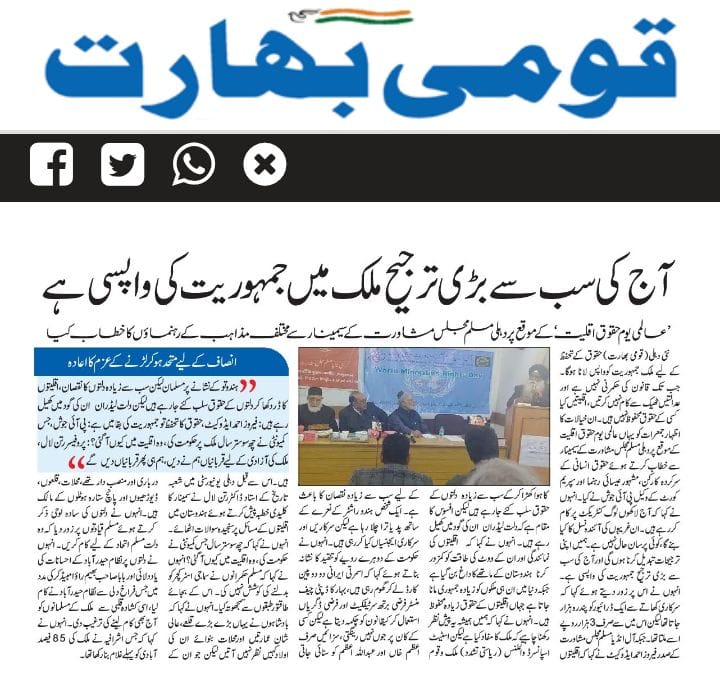
’عالمی یوم حقوق اقلیت‘ کے موقع پر دہلی مسلم مجلس مشاورت کے سیمینار سے مختلف مذاہب کے رہنماؤں کا خطاب ،انصاف کے لیے متحد ہوکرلڑنے کے عزم کا اعادہ، ہندو تو کے نشانے پر مسلمان لیکن سب سے زیادہ دلتوں کا نقصان،اقلیتوں کا ڈر دکھا کر دلتوں کے حقوق سلب کئے جارہے ہیں لیکن دلت لیڈران ان کی گود میں کھیل رہے ہیں: فیروز احمد ایڈوکیٹ، حقوق کا تحفظ تو جمہوریت کی بقا میں ہے: پی آئی جوس، جس کمیونٹی نے چھ سو ستر سال ملک پر حکومت کی، وہ اقلیت میں کیوں آگئی؟ : پروفیسر رتن لال، ملک کی آزادی کے لیے قربانیاں ہم نے دیں، ہم ہی پھر قربانیاں دیں گے: سردار دیا سنگھ روزنامہ قومی بھارت، نئی دہلی بتاریخ: 21 دسمبر،2025
मशावरत के पूर्व अध्यक्ष नवेद हामिद “क़ायद-ए-मिल्लत पुरस्कार” से सम्मानित
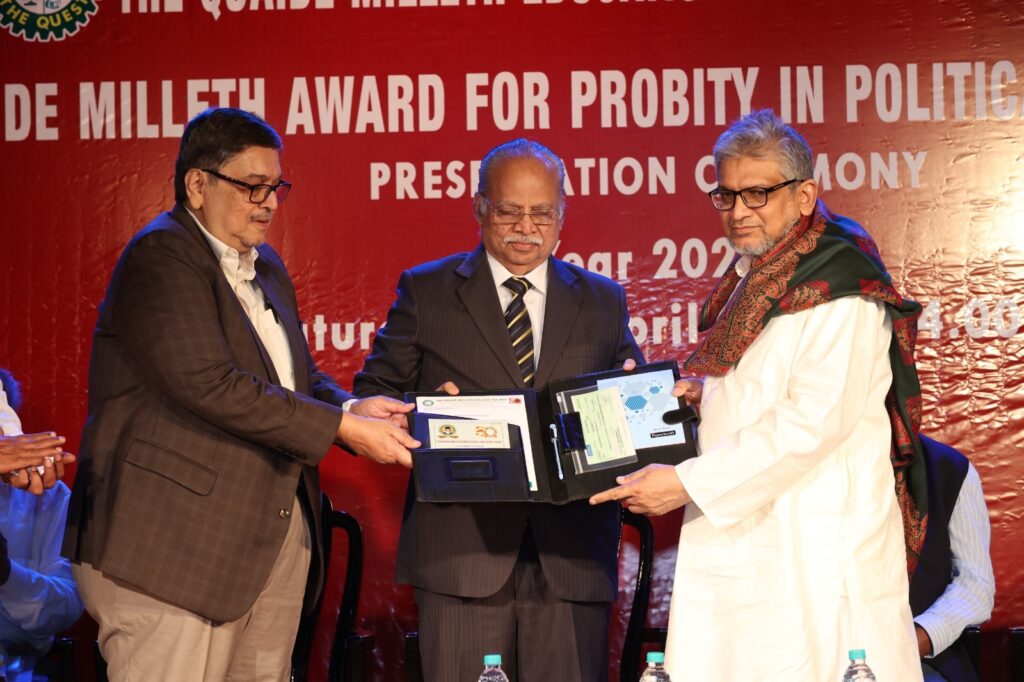
प्रो۔ विपिन कुमार त्रिपाठी और जॉन दयाल को भी सार्वजनिक जीवन में सत्यनिष्ठा के लिए सम्मानित किया गया नई दिल्ली: दक्षिण भारत के प्रतिष्ठित संस्थान, क़ायद-ए-मिल्लत एजुकेशनल एंड सोशल ट्रस्ट (चेन्नई) ने शनिवार को आयोजित एक भव्य समारोह में ऑल इंडिया मुस्लिम मजलिस-ए-मशावरत के पूर्व अध्यक्ष और मूवमेंट फॉर एम्पावरमेंट ऑफ़ इंडियन मुस्लिम्स के महासचिव नावेद हामिद, प्रसिद्ध मानवाधिकार कार्यकर्ता जॉन दयाल, तथा सद्भावना मिशन के संस्थापक, प्रसिद्ध वैज्ञानिक प्रो. विपिन कुमार त्रिपाठी को मद्रास हाई कोर्ट के पूर्व जज, जस्टिस के.एन. बाशा के हाथों “क़ायद-ए-मिल्लत पुरस्कार” से सम्मानित किया। जनजीवन में सत्यनिष्ठा के लिए दिया जाने वाला यह वार्षिक पुरस्कार एक प्रशस्ति पत्र, पाँच लाख रुपये और सम्मान चिन्ह व शाल पर आधारित है।इस अवसर पर जस्टिस बाशा ने पुरस्कार प्राप्तकर्ताओं को बधाई देते हुए कहा कि ऐसे महान व्यक्तित्वों को सम्मानित करने का अवसर पाकर वे स्वयं को गौरवान्वित महसूस कर रहे हैं, क्योंकि ये वे लोग हैं जो अंधकारमय वातावरण में प्रकाशस्तंभ का कार्य करते हैं। ट्रस्ट के महासचिव श्री एम जी दाऊद मियाखान ने कहा, “पुरस्कार विजेताओं को भारत में राजनीतिक और व्यक्तिगत जीवन में ईमानदारी के उनके बेदाग ट्रैक रिकॉर्ड के आधार पर दिया जाता है।” जबकि पूर्व बिशप डॉ वी देवसागयाम ने कहा कि “हम आपकी सेवाओं को सम्मान देने, आपकी पहल का समर्थन करने और यह कामना करने के लिए यहां हैं कि आप सभी बाधाओं के बावजूद अपनी लड़ाई जारी रखें।समारोह की अध्यक्षता क़ायद-ए-मिल्लत ट्रस्ट के अध्यक्ष क़ाज़ी डॉ. सलाहुद्दीन मोहम्मद अय्यूब ने की, जबकि पुरस्कार की घोषणा और विजेताओं का परिचय ट्रस्ट के महासचिव एम.जी. दाऊद मियाँख़ान ने किया। इस अवसर पर मद्रास विश्वविद्यालय के पूर्व कुलपति डॉ. एस. सादिक और चर्च ऑफ़ साउथ इंडिया के बिशप डॉ. देवसगायम का भी सम्मान किया गया। ट्रस्ट के महासचिव दाऊद मियाँ ख़ान, कोषाध्यक्ष एस. मुश्ताक़ अहमद और क़ायद-ए-मिल्लत कॉलेज के प्राचार्य डॉ. एम.ए. तवाब ने महानुभावों को प्रशस्ति पत्र, स्मृति चिन्ह और शॉल भेंट किए।2024 के “क़ायद-ए-मिल्लत पुरस्कार” की घोषणा फरवरी 2025 में की गई थी। पुरस्कार चयन समिति में डॉ. वसंती देवी (पूर्व कुलपति), डॉ. देवसगायम (पूर्व बिशप), श्री पनीरसेल्वम (रीडर्स एडिटर, द हिंदू) और दाऊद मियाँख़ान (महासचिव, क़ायद-ए-मिल्लत ट्रस्ट) शामिल थे।इससे पूर्व ट्रस्ट ने यह पुरस्कार जिन प्रमुख हस्तियों को प्रदान किया है, उन में तीस्ता सीतलवाड़, और नीलाकणु (2015), एन. शंकरैया और सैयद शाहाबुद्दीन (2016), माणिक सरकार और मोहम्मद इस्माइल (2017), भारत के पूर्व उपराष्ट्रपति डॉ. हामिद अंसारी और अरुणा रॉय (2018), ए.जी. नूरानी और थिरु मावलावन (2019), हर्ष मंदर और बिल्कीस बानो (2020), डॉ. इरफ़ान हबीब और संयुक्त किसान मोर्चा (2021), थिरु वी रामणी और द वायर न्यूज़ पोर्टल (2022), एन. राम (द हिंदू) और डॉ. अबू सालेह शरीफ़ शामिल हैं।यह पुरस्कार क़ायद-ए-मिल्लत मौलवी मोहम्मद इस्माइल की स्मृति में प्रदान किया जाता है, जो देश और समुदाय के निःस्वार्थ सेवक, स्वतंत्रता सेनानी और देश के प्रतिष्ठित नेता थे। भारत की आज़ादी के बाद देश और समुदाय के निर्माण में उनका महत्वपूर्ण योगदान रहा। वे संविधान सभा के सदस्य, लोकसभा और राज्यसभा के सदस्य, और इंडियन यूनियन मुस्लिम लीग के संस्थापक नेता थे। वे ऑल इंडिया मुस्लिम मजलिस-ए-मशावरत के संस्थापक सदस्यों में भी शामिल थे।क़ायद-ए-मिल्लत ट्रस्ट ने मौलवी मोहम्मद इस्माइल की चालीसवीं पुण्यतिथि पर इस पुरस्कार की स्थापना की थी, जिसे प्रत्येक वर्ष सार्वजनिक जीवन में सक्रिय प्रतिष्ठित व्यक्तियों को प्रदान किया जाता है।
جھارکھنڈ حکومت اور پریاگ کے مسلمانوں کے سیکولرزم اورانسانیت کی ستائش
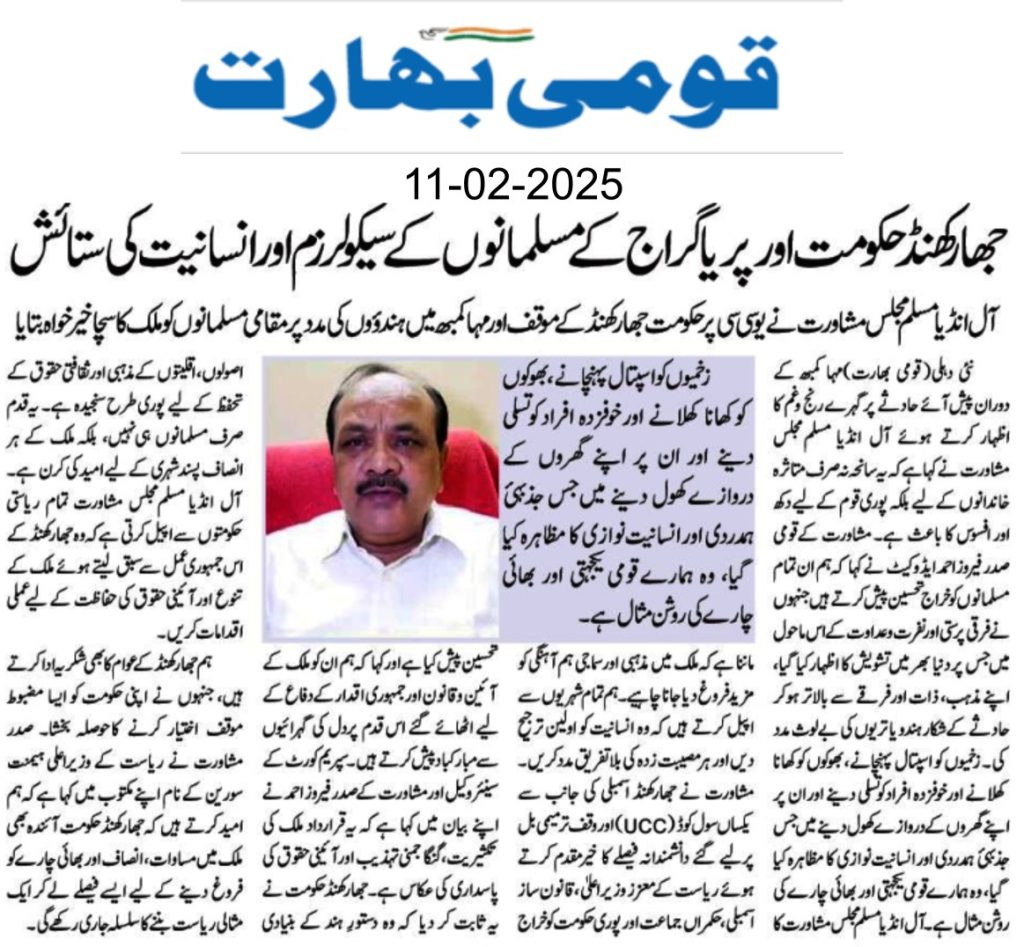
روزنامہ قومی بھارت، نئی دہلی بتاریخ: 11 فروری 2025
جھارکھنڈ حکومت اور پریاگ کے مسلمانوں کے سیکولرزم اورانسانیت کی ستائش
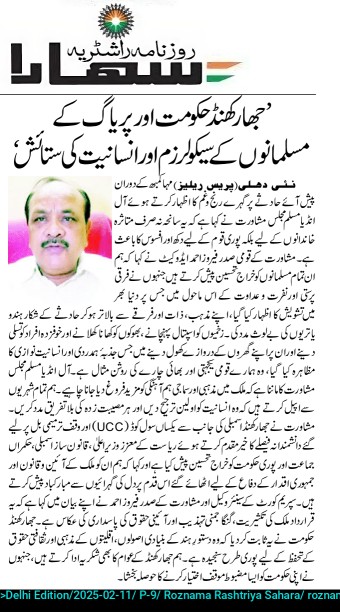
روزنامہ راشٹریہ سہارا بتاریخ: 11 فروری 2025
سابق وزیر اعظم ڈاکٹر منموہن سنگھ کے انتقال پر مسلم مجلس مشاورت کا اظہارتعزیت
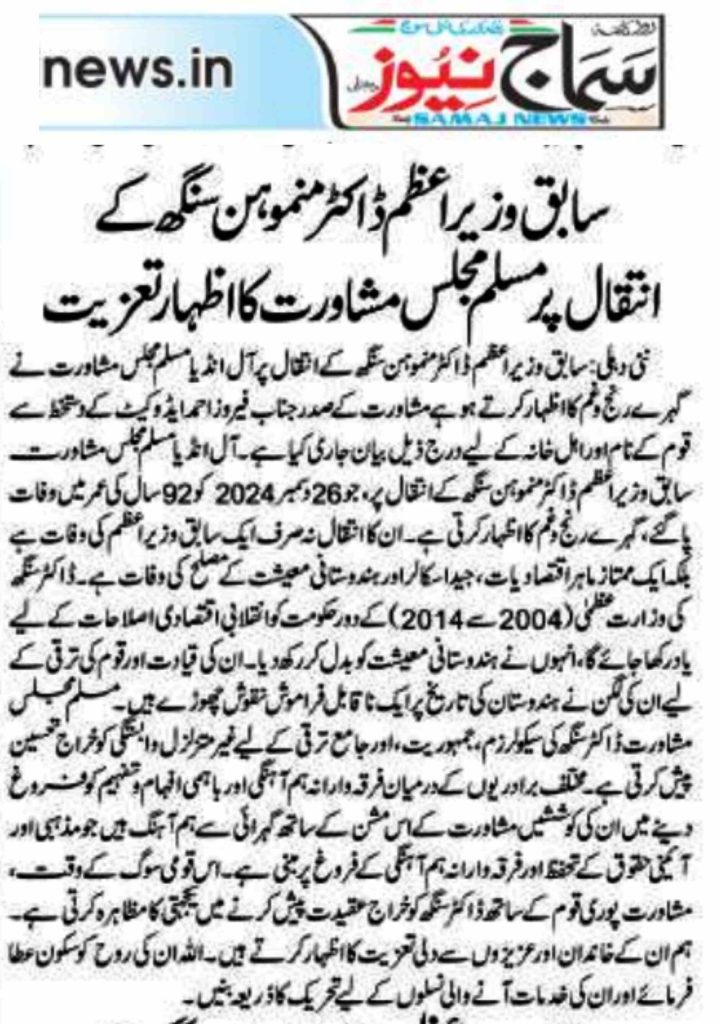
روزنامہ سماج نیوز ، اردو ، نئی دہلی بتاریخ: 28 دسمبر،2024
AIMMM’s Protest against CBSE’s Hostile Policy towards Urdu
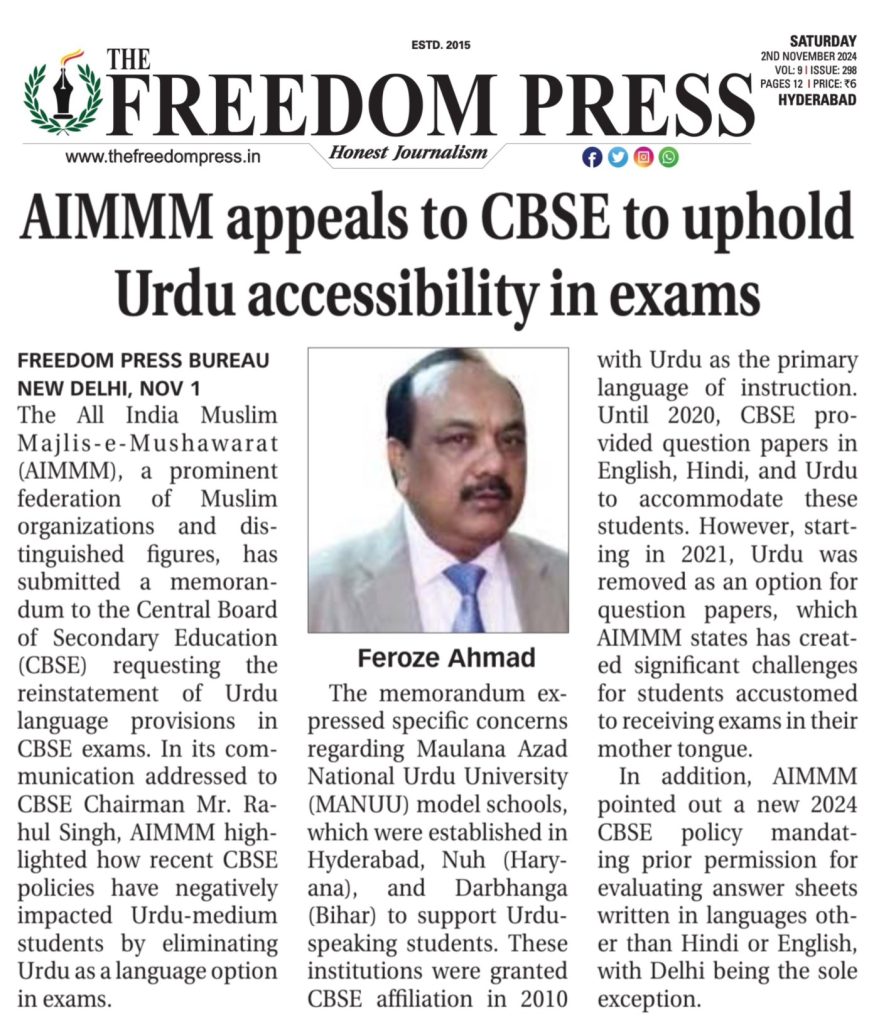
Freedom Press Dated: 02 November,2024
Mushawarat Slams ‘Anti-Urdu Policy’ of CBSE

In a memorandum to CBSE chairman, Mushawart president demanded to withdraw its decision to drop Urdu as one of the languages to write Class 10 and Class 12 board exams NEW DELHI – All India Muslim Majlis-e-Mushawarat (AIMMM), a confederation of Muslim organisations, has slammed the Central Board of Secondary Education (CBSE) for its decision to drop Urdu as one of the languages to write Class 10 and Class 12 board exams and demanded to withdraw its decision. Firoz Ahmed, AIMMM president, on Friday, has sent a memorandum to CBSE chairman Rahul Singh describing the policy of the CBSE as “Anti-Urdu”. “This policy has not only affected MANUU-affiliated institutions but has also jeopardized the accessibility and continuation of Urdu-medium education nationwide, even at centrally supported institutions such as Maulana Azad National Urdu University (MANUU). By restricting students from writing exams in their mother tongue, CBSE undermines the principle of multilingualism and inclusion endorsed by the New Education Policy 2024, which promotes the nurturing of education in regional languages.” Mushawarat president said. The Maulana Azad National Urdu University initiated three model schools in 2010 in Hyderabad, Nuh (Haryana), and Darbhanga (Bihar) to cater specifically to Urdu-speaking students. These schools received CBSE affiliation with the full understanding that Urdu was the primary medium of instruction. Until 2020, CBSE provided examination question papers in English, Hindi, and Urdu for students of these institutions. However, beginning in 2021, CBSE discontinued Urdu as an option for question papers, without prior consultation with MANUU or Urdu medium stakeholders. Since then, students have faced considerable academic challenges, as they are now forced to attempt questions provided only in Hindi and English. Furthermore, in June 2024, CBSE introduced an additional policy that disallows the evaluation of answer papers written in languages other than Hindi or English without prior permission, except in the National Capital Territory of Delhi. This has placed significant obstacles on Urdu medium students across the country. Mushawarat sought the immediate reinstatement of the previous policy allowing students to receive question papers in Urdu and to write their answers in Urdu and the intervention of the Union Minister for Education to uphold multilingual provisions and reconsider the policy that limits the use of Urdu in examinations. “Urdu is always one of the scheduled national languages of the country and the mother tongue of more than six million citizens of India, as well as one of the official languages of many states of the union. The restriction on question papers and conducting examinations in Urdu is a clear violation of the rights given by the constitution and law,” said Ahmed. With this memorandum, AIMMM sought to ensure that Urdu-speaking students are granted the respect, accessibility, and linguistic inclusion they are entitled to under national policy. “We trust that CBSE will take prompt action to address these issues,” the memorandum said.
حلقہ بندی کے عمل پر قرارداد
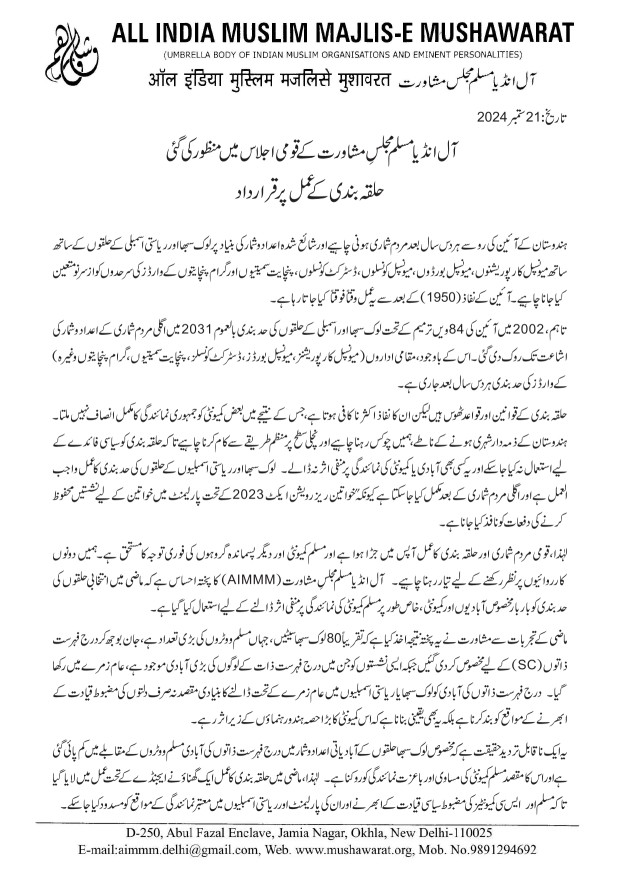
آل انڈیا مسلم مجلسِ مشاورت کے قومی اجلاس میں منظور کی گئی تاریخ:21 ستمبر2024 ہندوستان کے آئین کی رو سے ہر دس سال بعد مردم شماری ہونی چاہیے اور شائع شدہ اعداد و شمار کی بنیاد پر لوک سبھا اور ریاستی اسمبلی کے حلقوں کے ساتھ ساتھ میونسپل کارپوریشنوں، میونسپل بورڈوں، میونسپل کونسلوں، ڈسٹرکٹ کونسلوں، پنچایت سمیتیوں اور گرام پنچایتوں کے وارڈز کی سرحدوں کو ازسرنو متعین کیا جانا چاہیے۔ آئین کے نفاذ(1950 ) کے بعد سے یہ عمل وقتاً فوقتاً کیا جاتارہا ہے۔ تاہم، 2002 میں آئین کی 84ویں ترمیم کے تحت لوک سبھا اور اسمبلی کے حلقوں کی حد بندی بالعموم 2031 میںاگلی مردم شماری کے اعداد و شمار کی اشاعت تک روک دی گئی۔ اس کے باوجود، مقامی اداروں (میونسپل کارپوریشنز، میونسپل بورڈز، ڈسٹرکٹ کونسلز، پنچایت سمیتیوں، گرام پنچایتوں وغیرہ) کے وارڈز کی حد بندی ہر دس سال بعد جاری ہے۔ حلقہ بندی کے قوانین اور قواعد ٹھوس ہیں لیکن ان کا نفاذ اکثر ناکافی ہوتا ہے، جس کے نتیجے میں بعض کمیونٹی کو جمہوری نمائندگی کا مکمل انصاف نہیں ملتا۔ ہندوستان کے ذمہ دار شہری ہونے کے ناطے، ہمیں چوکس رہنا چاہیے اور نچلی سطح پر منظم طریقے سے کام کرنا چاہیے تاکہ حلقہ بندی کو سیاسی فائدے کے لیے استعمال نہ کیا جا سکے اور یہ کسی بھی آبادی یا کمیونٹی کی نمائندگی پر منفی اثر نہ ڈالے۔ لوک سبھا اور ریاستی اسمبلیوں کے حلقوں کی حد بندی کا عمل واجب العمل ہے اور اگلی مردم شماری کے بعد مکمل کیاجاسکتا ہے کیونکہ “خواتین ریزرویشن ایکٹ 2023کے تحت پارلیمنٹ میں خواتین کے لیے نشستیں محفوظ کرنے کی دفعات کو نافذ کیا جانا ہے۔ لہٰذا، قومی مردم شماری اور حلقہ بندی کا عمل آپس میں جڑا ہوا ہے اور مسلم کمیونٹی اور دیگر پسماندہ گروہوں کی فوری توجہ کا مستحق ہے۔ ہمیں دونوں کارروائیوںپر نظر رکھنے کے لیے تیار رہنا چاہیے۔ آل انڈیا مسلم مجلسِ مشاورت (AIMMM) کا پختہ احساس ہے کہ ماضی میں انتخابی حلقوں کی حدبندی کو بار بار مخصوص آبادیوں اور کمیونٹی، خاص طور پر مسلم کمیونٹی کی نمائندگی پر منفی اثر ڈالنے کے لیے استعمال کیا گیا ہے۔ ماضی کے تجربات سے مشاورت نے یہ پختہ نتیجہ اخذ کیا ہے کہ تقریباً 80 لوک سبھا سیٹیں، جہاں مسلم ووٹروں کی بڑی تعداد ہے، جان بوجھ کر درج فہرست ذاتوں (SC) کے لیے مخصوص کر دی گئیں جبکہ ایسی نشستوں کو جن میںدرج فہرست ذات کے لوگوں کی بڑی آبادی موجود ہے، عام زمرے میں رکھا گیا۔ درج فہرست ذاتوں کی آبادی کو لوک سبھا یا ریاستی اسمبلیوں میں عام زمرے کے تحت ڈالنے کا بنیادی مقصد نہ صرف دلتوں کی مضبوط قیادت کے ابھرنے کے مواقع کو بند کرنا ہے بلکہ یہ بھی یقینی بنانا ہے کہ اس کمیونٹی کا بڑا حصہ ہندو رہنماؤں کے زیر اثر رہے۔ یہ ایک ناقابل تردید حقیقت ہے کہ مخصوص لوک سبھا حلقوں کے آبادیاتی اعداد و شمار میں درج فہرست ذاتوں کی آبادی مسلم ووٹروں کے مقابلے میں کم پائی گئی ہےاور اس کا مقصد مسلم کمیونٹی کی مساوی اور باعزت نمائندگی کو روکنا ہے۔ لہٰذا، ماضی میں حلقہ بندی کا عمل ایک گھناؤنے ایجنڈے کے تحت عمل میں لایا گیا تاکہ مسلم اور ایس سی کمیونٹیز کی مضبوط سیاسی قیادت کے ابھرنے اور ان کی پارلیمنٹ اور ریاستی اسمبلیوں میں معتبر نمائندگی کے مواقع کومسدود کیا جا سکے۔ آل انڈیا مسلم مجلس مشاورت حد بندی کے عمل میں اپنائے گئے رائج طریقہ کار اور چالاکیوں کی شدید مذمت کرتی ہے اور اقلیتوں اور دیگر پسماندہ گروہوں سے اپیل کرتی ہے کہ وہ حلقہ بندی کے عمل کے دوران اپنے مفادات کی حفاظت کے لیے چوکس رہیں اور حلقہ بندی کے مختلف مراحل میں ریاستی چیف الیکٹورل افسران، نیشنل الیکشن کمیشن اور ضلع مجسٹریٹ (جو اپنے متعلقہ اضلاع کے لیے الیکشن آفیسر بھی ہوتے ہیں) کے ذریعے حتمی نوٹیفکیشن سے قبل ضروری اصلاحات کا مطالبہ کریں۔ مسلم مجلسِ مشاورت ماضی میں حلقہ بندی کے قوانین اور قواعد کی خلاف ورزیوں کی شدید مذمت کرتی ہے جو وقتاً فوقتاً عمل میں آئیں۔مشاورت کا پختہ یقین ہے کہ ہندوستان کے الیکشن کمیشن، ریاستی چیف الیکٹورل افسران، اور ضلع مجسٹریٹس کو ان خلاف ورزیوں سے مہذب اور جرات مندانہ طورپر آگاہ کیا جانا چاہیے اور بروقت سوالات اٹھانے چاہئیں کہ ضروری اصلاحات کا عمل کب شروع کیا جائے گا اور حلقہ بندی کا حتمی نوٹیفکیشن کب جاری کیا جائے گا۔ہماراماننا ہےکہ ان اصلاحات کو سماجی تنظیموں کی طرف سے سروے اور حکومت کے دستیاب اعداد و شمار پر مبنی تحقیق کے ذریعے مسلسل مکالمے کے ذریعے یقینی بنایا جانا چاہیے۔ مشاورت کا یہ اجلاس اس بات کی بھی توثیق کرتا ہے کہ اس مسئلے کو سستی سیاسی تشہیر کے لیے سماجی کام کے نام پر عوامی طور پر اچھالنے کے بجائے، بنیادی مقصد پر سنجیدگی سے توجہ مرکوز کرنا زیادہ فائدہ مند ہوگا جو کہ مسلمانوں اور دیگر پسماندہ گروہوں کے عوام کے انتخابی حقوق کی حفاظت ہے۔ مسلم مجلس مشاورت یہ بھی تجویز کرتی ہے اور اپیل کرتی ہے کہ دونوں کمیونٹیز، یعنی دلت اور مسلمانوں کی معتبر سماجی قیادت سیاسی بصیرت کے ساتھ مشترکہ طور پر کام کرے تاکہ قومی مردم شماری کے بعد شروع ہونے والے حلقہ بندی کے عمل کے دوران مناسب ہم آہنگی کو یقینی بنایا جا سکے۔ مجلسِ مشاورت کو امید ہے کہ سمجھداری غالب آئے گی اور مذہبی تنظیمیں اپنے اداروں کو اس عمل میں ملوث کرنے سے گریز کریں گی کیونکہ یہ ممکنہ طور پر ردعمل پیداکر سکتا ہے۔ پیش کنندہ:نوید حامد، ڈاکٹر سید ظفر محمود اور احمد جاوید کی آراء کے ساتھمقام:نئی دہلی
Resolution on assurance of TN Chief Minister to extend reservations to SC converts to Islam in the state

Adopted at the National Meeting of All India Muslim Majlis-e-Mushawarat Date: 21st September, 2024 All India Muslim Majlis e Mushawarat (AIMMM) welcomes the announcement of the Tamil Nadu chief minister Mr. MK Stalin, on the floor of the assembly, for considering for reservation benefits to Schedule Caste members who converted to Islam after consultation with the legal luminaries. AIMMM also noted with satisfaction Mr. Stalin’s commitment emphasizing the government’s commitment for safeguarding the interests of all such backward social groups as paramount. The announcement comes in continuation of a resolution passed in the State Assembly a year back urging the Central Government to bring amendments in the laws to pave the way for giving reservation to the ‘Adi Dravidians’ who have converted to Christianity. The blocking of greater social inclusion and equality in the country by the central government has been resisted by several state governments who oppose the vision of social exclusion of the communities who have converted their faith. Mushawarat is of the opinion that the equity can never be achieved with universal distribution of benefits of social justice without any prejudice and apartheid. Indeed no one can deny that there is a new tussle between the votaries of social inclusiveness and those who vouch for exclusive Hindu society, pushing out the ‘others’ from the development paradigm in the country. Mushawarat also welcomes the initiative and continuous campaign of Mr. MH Jawahirullah MLA and member of AIMMM for raising the issue of the equitable justice for the scheduled caste converts to Islam on whose demand the CM Stalin had assured about the issue in the assembly. AIMMM hopes that the various other state governments will take the lead in extending affirmative actions for schedule caste converts to Christianity and Islam. (Proposed by Mr. Navaid Hamid)
